

Do You Have Any Advice for Young Writers? Many have asked, and so I will answer.
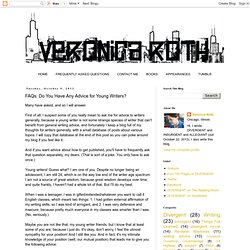
First of all: I suspect some of you really mean to ask me for advice to writers generally, because a young writer is not some strange species of writer that can't benefit from general writing advice, and fortunately I keep a blog full of my thoughts for writers generally, with a small database of posts about various topics. I will copy that database at the end of this post so you can poke around my blog if you feel like it. The Gift of The Axe. I want to talk about the little blessing in disguise known as word count guidelines.

When I finished TM and fixed it (or so I thought), it was complete at 112,000 words. The average YA book is 80,000 to 90,000 words for a new author (or somewhere around there). For those of you who want to object with "But Harry Potter books were NEVER that short! " I am sorry, but you are wrong. The first Harry Potter book was around 80,000 words long. Some NaNo Advice: DON'T LOOK BACK. Writing, Revising, and (Not) Making Decisions. Writing is all about decision-making, whether you are deciding what word to use or what a character is like or what happens next in the story.
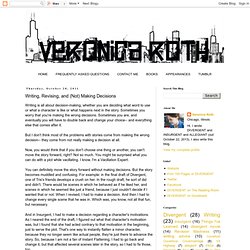
Sometimes you worry that you're making the wrong decisions. Sometimes you are, and eventually you will have to double back and change your choice-- and everything else that comes after it. How I Revise: Insurgent Edition. I'm not a huge fan of coming up with a revising system.
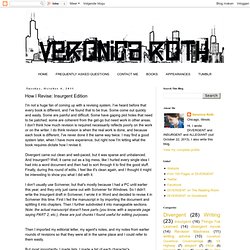
I've heard before that every book is different, and I've found that to be true. Some come out quickly and easily. Some are painful and difficult. Some have gaping plot holes that need to be patched; some are coherent from the get-go but need work in other areas. I don't think how much revision is required necessarily reflects poorly on the work or on the writer. Divergent came out clean and well-paced, but it was sparse and unbalanced. New Piece of Advice: Stop Listening to Advice. The writer blogosphere is full of writing advice.
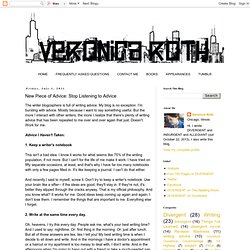
My blog is no exception. I'm bursting with advice. Mostly because I want to say something useful. Rules: Friends of Creativity (And Enemies of Car Accidents) When people find out I'm a writer, they tend to ask a lot of questions about the writing process.

(Generally, "How do you do that? Just sit down and write a book? ") And I understand that, because it's probably mysterious to the outside observer, like I just shut myself into a room and ideas burst from every fingertip like gold ribbon and Skittles. Anyway, I think talking about specific aspects of The Process can be interesting. Some Advice for Young Writers: Above All, Do the Work. What I Learned About Dialogue, Thanks to Grey's Anatomy. I was never one of those Grey's Anatomy watching people.
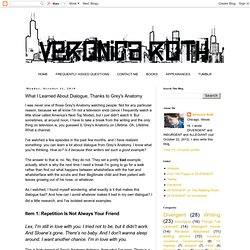
Not for any particular reason, because we all know I'm not a television snob (since I frequently watch a little show called America's Next Top Model), but I just didn't watch it. But sometimes, at around noon, I have to take a break from the writing and the only thing on television is, you guessed it, Grey's Anatomy on Lifetime. Oh, Lifetime. What a channel. Like A Party In Your Brain: World-Building. Today the scary ogre of a topic that is on my mind is world-building.
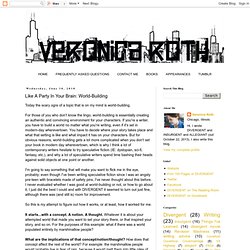
For those of you who don't know the lingo, world-building is essentially creating an authentic and convincing environment for your characters. If you're a writer, you have to build a world no matter what you're writing, even if it's set in modern-day wherevertown. You have to decide where your story takes place and what that setting is like and what impact it has on your characters. But for obvious reasons, world-building gets a lot more complicated when you don't set your book in modern day wherevertown, which is why I think a lot of contemporary writers hesitate to try speculative fiction (IE: dystopian, sci-fi, fantasy, etc.), and why a lot of speculative writers spend time bashing their heads against solid objects at one point or another. So this is my attempt to figure out how it works, or at least, how it worked for me.
It starts...with a concept. What are the implications of that concept/notion/thought? Best of 2011: Writing Music. I don't know about you, but Best of 2011 lists are quickly becoming my blog crack now that the Christmas festivities have come to a close.
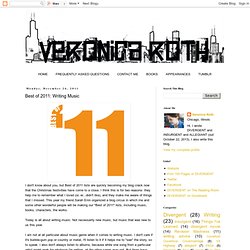
I think this is for two reasons: they help me to remember what I loved (or, er...didn't like), and they make me aware of things that I missed. This year my friend Sarah Enni organized a blog circus in which me and some other wonderful people will be making our "Best of 2011" lists, including music, books, characters, the works. Today is all about writing music. Not necessarily new music, but music that was new to us this year.
I am not at all particular about music genre when it comes to writing music. 1.